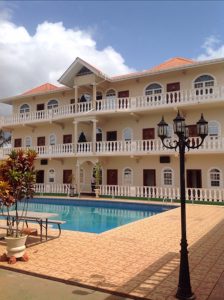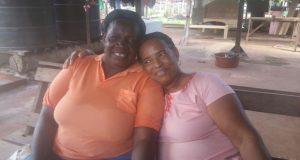
NO SIN CITY –Mahdia pushes for agri diversification
SIGNIFICANTLY hit by the drop in gold prices, it is believed that the time has come for Mahdia, the economic capital and commercial hub of the Potaro/Siparuni expanse of Region 8, to diversify its economy.For approximately 131 years, Mahdia has been highly dependent on the mining of gold and diamonds. In fact, the community was established in 1884 by ex-slaves who had travelled from the County of Berbice and the East Coast of Demerara in search of gold.
Like other mining communities, Mahdia is presently struggling to keep its head above the proverbial rough economic waters as the price of gold continues to dip.
After peaking at US$1,921.11 an ounce on the world market in September 2011, the price of gold fell to as low as US$1,180.50 in June 2013 — the lowest price since 2010. Today, it stands at US$1,064.96.
Looking ahead, renowned businessman Roger Hinds, fondly known as the ‘Godfather’ of Mahdia, said the time has come for Mahdia — and Region 8 in general — to invest time and energy into development of the agriculture sector.
Formerly a miner, Hinds has moved to capitalise on the tourism, hospitality and food sectors, and is today the owner of a gas station in Linden, Region 10, besides two hotels, restaurants and a grocery store in Mahdia.
Juan Hunter, Coordinator of the Mahdia Group, said the community now has to see itself as a “regional agricultural distribution and processing hub.” In order to achieve economic stability and sustainable development, Mahdia must turn to agriculture, he posited.
L Bell, who has been living in Mahdia for more than 40 years, is now into farming, after having spent years in mining for gold. At Maikwak, approximately 20 minutes’ travel from Mahdia, Bell and his brother are cultivating strawberries.
“We are now planting strawberry in Maikwak, and soon we will be looking for markets,” an optimistic Bell disclosed.
CHANGE IS NECESSARY
According to him, the community will crumble if it continues to depend heavily on the mining of gold and diamonds. “We have to move away from mining, maybe in the next five years; but if we continue this way, what will we have to mine?” Bell rhetorically asked the Guyana Chronicle.
“I see now we are importing plantain chips and potato chips from Trinidad. Why do we have to import these things? Why can’t we package plantain chips and potato chips right here in Mahdia and sell to the rest of Guyana?” he asked.
The establishment of food processing plants and garment and furniture factories were among the ideas placed on the table by Bell. But he said government cannot do it alone, and he called on private investors to pump their financial resources into the development of Mahdia – a community identified by the David Granger Administration for township status.
But in addition to development of the agriculture sector, Bell said government’s intervention is necessary at this stage to salvage the community, which has been ruined by prostitution, unemployment, and a poor education system.
Like many other residents, Bell bemoaned the lack of a technical institute in the area.
“The Government (has) to try and do something… Mahdia needs a technical institute, so that the young men and women of Mahdia can learn a trade; they can become electricians, carpenters, technicians and even engineers. Something must be done,” he lamented.
He said it is sad to know that Mahdia, a community which has been in existence for more than 100 years, does not have proper playgrounds and recreational facilities.
“We don’t even have a basketball court or a community centre. We don’t have nothing! A simple play field for the children we don’t have,” said a disappointed Bell.
Mahdia’s education sector is in a sad and unacceptable state, Jennifer Alphonso told Guyana Chronicle. Alphonso has been living in Mahdia since 1980, and according to her, “something is definitely wrong” at the Mahdia Secondary School.
“Ever so often we read and hear about schools in Guyana excelling at CSEC, but what is happening in Mahdia? Why they can’t do good? You want tell me all the children in Mahdia dunce?” Alphonso questioned.
She is of the opinion that many teachers posted at the Mahdia Secondary School are untrained and under-qualified. “I don’t know if they even have a proper CXC syllabus,” she added.
PRIVATE SCHOOL
She said children attending the private secondary school in the area are doing much better than those in the public system. “I learnt that the children there are doing better… but there are some allegations against the owners; and if he is found guilty and the government close down his school, what will happen to the children of Mahdia?” Alphonso asked.
She is calling on the Education Ministry to investigate the state of the education system in Mahdia. She posited that much needed attention is required in this area.
“There is also an influx of prostitutes in Mahdia; the young, old and in-between are coming,” Alphonso added. Much to her dissatisfaction, she said, women from all parts of Guyana, and even from Caribbean countries, travel to Mahdia to become prostitutes.
“They even have women coming from Brazil and Venezuela,” she disclosed, but made it clear that many of the commercial sex workers are not residents of Mahdia.
“I was so disappointed to see Mahdia being referred to as the Sin City. There are hard-working men and women in Mahdia, so I hope that this image can be changed for the better.”
However, she admitted that some of the young women in the community are turning to prostitution because of the lack of jobs.
“When they leave school, they go in the backdam, be a cook, or wuk in a bar, or tek a man. When they tek the man, if he ain’t from here, he mek two children and gone, and somebody else got to look at them. Life should not be like that,” she lamented.
Parents who are financially capable, and desire the best for their children, are often forced to send their children to Linden or Georgetown to pursue higher education.
Maphilda Leonce, also known as ‘Sister P’, who has been living in Mahdia for 30 years, has said that given the prevailing social issues, the community is in dire need of welfare officers and counsellors.
NEED ATTENTION
“We have young boys and girls just loitering, smoking weed and drinking, not going to school; these children need attention, they need counselling,” Leonce said, as she spoke of her personal experience as a grandmother.
Leonce also complained about the lack of water in Mahdia. She has not been receiving water through her tap for the past three years; other residents have not had water for the past five years.
“We have a water crisis in Mahdia. We would have to pay people for water. A tank of water is $6000, a barrel of water is $1000, and a bucket of water $200,” she explained.
In addition to the lack of water, residents have, for years, been coping with an unreliable electricity system, deplorable roads, and a hospital that ever so often runs out of critical medications.
“We have a long way to go,” she said. “Achieving township status is good, but Mahdia needs real development.”
By Svetlana Marshall



